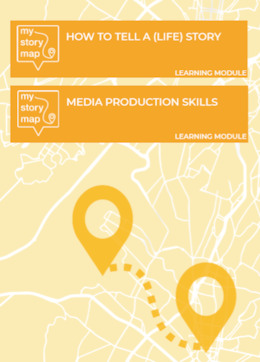Toolbox — For Training and Youth Work
All new tools in your inbox: Be the first to know about new tools for learning with our e-mail notifications.
Manual
How to tell a (life) story and Media production skills
The booklet addresses professionals working with early school leavers and young people at risk of drop out. It offers tools for reflection and personal development in relation to the topic of Early School Leaving through the use of digital story-mapping.
Aims of the tool
The learning modules aim to provide guidance and orientation for professional in order to be able to develop a modular multi-sessions workshop, based on a mix of both experiential and theoretical activities, targeting early school leavers and/or young people at risk of drop out. The workshop engages the participants in an experienced focused on the use of digital story-mapping, in which they are encouraged to investigate and organise in a digital story-map flow the context, the causes and the reasons that led them to the idea/decision of dropping out of the educational and/or training system.
Description of the tool
The work with young people distinguishes itself by a high level of ambiguity and therefore requires an approach that allows the acknowledgement of the specific backgrounds and the development of the uniqueness of every single person. The workshops is based on the principle of learning inclusion and it provides a wide variety of educational approaches and tools, able to stimulate different learning styles and to activate very different psychological and cognitive channels throughout all its four phases. The learners are engaged in opportunities for discussion and comparison, group work, simulations, outdoor experiences, moments of reflection and sharing, with the idea to promote an experience as rich and diversified as possible.
The experience designed for a small group framework, however the concept of modularity is strictly linked to the idea of a flexible learning curriculum, in which nothing is fixed for good, but where there is the opportunity at all levels to choose and combine contents in different ways according to the context of each particular learning situation.
The content of the booklet is organized and divided into five main parts:
- the methodology of personal stories through digital story-mapping;
- the overview of the workshop experience in terms of approach and structure, accompanied by the outline of the four learning phases;
- the learning objectives, looking at the identified competences to be developed through the work¬shop and contextualising them into the frame of the work on digital story-mapping applied to Early School Leaving;
- the self-as¬sessment, providing a format specifically designed around the identified learning objectives of the workshop and explaining how the outcomes of the self-assessment can be a resource for both the learners and the facilita¬tors, providing an additional support in order to better understand how to design the workshop experience;
- the outline of all the learning materials for the face-to-face sessions which have been selected in order to respond and address the identified learning objectives, divided according to the content and purpose of each specific learning session.
By asking young people to engage in a process of personal storytelling, the workshop allows them to give meaning to an event, a situation, a period of their life. Pedagogically, this way of enunciating one’s own story offers the possibility of getting to know oneself in a deeper way, increasing one’s own personal awareness and fostering individual empowerment. By engaging in this process, young people ultimately learn not only how to identify and describe facts and events, but how to make sense of them. The workshop is designed in order to build an environment of safety and trust in which reactions and responses, whether individual or collective, become the object of careful evaluation, of listening, of respect, of self-evaluation.
Available downloads:
Disclaimer
SALTO cannot be held responsible for the inappropriate use of these training tools. Always adapt training tools to your aims, context, target group and to your own skills! These tools have been used in a variety of formats and situations. Please notify SALTO should you know about the origin of or copyright on this tool.
Tool overview

http://toolbox.salto-youth.net/2846
This tool is for
Young people who dropped out of the education/training pathway, young people at risk of drop out, young NEET.
and addresses
Personal Development
It is recommended for use in:
Strategic Partnerships
Duration:
The workshop experience is divided into 4 phases, thus covering an amount from 20 to 30 hours in total.
Behind the tool
The tool was created by
MY STORY MAP international consortium: IISS PIAGET DIAZ (Italy), REPLAY NETWORK (Italy), PISTES SOLIDAIRES (France), ASOCIACION MUNDUS (Spain), EUROGEO (Belgium), DIE BERATER (Austria)
in the context of
The learning modules are the result of the 2 years ERASMUS+ KA2 School Strategic Partnership project MY STORY MAP, realized by a consortium of schools and non formal education organisations
The tool has been experimented in
My Story Map project, KA2 School
The tool was published to the Toolbox by
ANDREA MESSORI (on 27 April 2020)
and last modified
27 April 2020
Comments
No comments have been posted yet.
If you want to comment on this tool, you need to be signed in with your MySALTO account. Sign in now